Por favor, use este identificador para citar o enlazar este ítem:
https://hdl.handle.net/11000/36498Registro completo de metadatos
| Campo DC | Valor | Lengua/Idioma |
|---|---|---|
| dc.contributor.author | Parmigiani De Marco, Jean Carlos | - |
| dc.contributor.author | Oppong Asante, Kwaku | - |
| dc.contributor.author | Brazo-Sayavera, Javier | - |
| dc.contributor.author | Barreto Schuch, Felipe | - |
| dc.contributor.author | Pelegrini, Andreia | - |
| dc.contributor.other | Departamentos de la UMH::Psicología de la Salud | es_ES |
| dc.date.accessioned | 2025-04-14T14:57:03Z | - |
| dc.date.available | 2025-04-14T14:57:03Z | - |
| dc.date.created | 2025 | - |
| dc.identifier.citation | Revista de Psicología Clínica con Niños y Adolescentes Vol. 12 nº. 2- mayo 2025 - pp 126-133 | es_ES |
| dc.identifier.issn | 2340-8340 | - |
| dc.identifier.uri | https://hdl.handle.net/11000/36498 | - |
| dc.description.abstract | Satisfacción con la Vida y Riesgo de Depresión: El papel de las habilidades socioemocionales de los adolescentes. La ausencia de enfermedad mental no significa necesariamente la presencia de salud mental o bienestar. Especialmente después de la pandemia de COVID-19, es importante identificar el riesgo y prevenir el desarrollo de enfermedades mentales. El presente estudio tuvo como objetivos: a) caracterizar los niveles de bienestar y satedades comprendidas entre 11 y 20 años (M=14,47, DT=1,91). Los participantes asisten a escuelas públicas de 3er ciclo de enseñanza básica (4ionales incluidas en loemocional, resistencia al estrés y sociabilidad). Los resultados refuerzan la existencia de un doble continuo de salud mental y enfermedad mental. Los resultados también apoyan la relevancia de implementar intervenciones escolares para promover habilidades socioemocionales que ayuden a los adolescentes a afrontar los retos de un mundo cambiante, y para prevenir la depresión. Desde la perspectiva de la salud pública, es esencial implementar programas de prevención universal que formen parte del paradigma de las escuelas promotoras de la salud. | es_ES |
| dc.description.abstract | The absence of mental illness does not necessarily mean the presence of mental health or well-being. Especially after the COVID-19 pandemic, it is important to identify the risk and prevent the development of mental illness. The present study aimed to: a) characterize the levels of well-being and life satisfaction of adolescents; b) identify the risk of depression; c) analyze differences in the three dimensions of mental health considering sociodemographic characteristics (gender and level of education); and d) analyze predictors of life satisfaction and risk of depression, considering the sociodemographic characteristics and social-emotional skills. Participated in the study 3235 adolescents (50% female), aged between 11 and 20 years (M=14.47, SD=1.91). Participants attend public schools in the 3rd cycle of basic education (47.9%) and secondary education (52.1%), and responded to self-report measures. The results revealed that most adolescents (58.5%) have an average level of life satisfaction. However, 51.1% of participants have a low level of well-being and 19.6% are at risk of depression. All the social-emotional skills included in the models proved to be significant predictors of life satisfaction and lower risk of depression, especially optimism (besides emotional control, stress resistance and sociability). The results reinforce the existence of a double continuum of mental health and mental illness. The results also support the relevance of implementing school-based interventions to promote social-emotional skills that help adolescents deal with the challenges of a changing world, and to prevent depression. From a public health perspective, it is essential to implement universal prevention programs that are part of the paradigm of health-promoting schools. | es_ES |
| dc.format | application/pdf | es_ES |
| dc.format.extent | 8 | es_ES |
| dc.language.iso | eng | es_ES |
| dc.publisher | Universidad Miguel Hérnández de Elche | es_ES |
| dc.rights | info:eu-repo/semantics/openAccess | es_ES |
| dc.rights | Attribution-NonCommercial-NoDerivatives 4.0 Internacional | * |
| dc.rights.uri | http://creativecommons.org/licenses/by-nc-nd/4.0/ | * |
| dc.subject | bienestar | es_ES |
| dc.subject | satisfacción con la vida | es_ES |
| dc.subject | depresión | es_ES |
| dc.subject | habilidades socioemocionales | es_ES |
| dc.subject | adolescentes | es_ES |
| dc.subject.other | CDU::1 - Filosofía y psicología::159.9 - Psicología | es_ES |
| dc.title | Is meeting 24-h Movement Guidelines associated with suicidal behavior in Brazilian adolescents? A cross-sectional study | es_ES |
| dc.type | info:eu-repo/semantics/article | es_ES |
| dc.relation.publisherversion | 10.21134/rpcna.2025.12.2.6 | es_ES |

Ver/Abrir:
6-2457.pdf
354,32 kB
Adobe PDF
Compartir:
 La licencia se describe como: Atribución-NonComercial-NoDerivada 4.0 Internacional.
La licencia se describe como: Atribución-NonComercial-NoDerivada 4.0 Internacional.
.png)